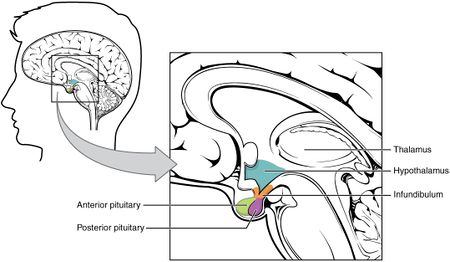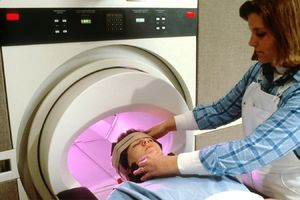The hypothalamus is an organ central to many autonomous functions of the human body, notably the regulation of homeostasis.
An integral part of the central nervous system; regulates processes of the endocrine system; regarded as an organ of the limbic system.It is:
- This tiny little structure (it only accounts for less than 1% of the brain’s weight) is located just underneath the thalamus, above the pituitary gland.
- The hypothalamus controls body temperature, hunger, thirst and circadian cycles. It is the control system which regulates the pituitary gland, the 'master gland' of the body.
Anatomy
 |
| Hypothalamus |
The hypothalamus is found underneath the thalamus and comprises the floor of the third ventricle (one of four open spaces in the brain through which cerebrospinal fluid flows). The hypothalamus extends downward from the brain into a stalk known as the pituitary stalk (or infundibular stalk), which connects it to the pituitary gland.
The hypothalamus has three main regions (anterior, medial and posterior). Each one contains different nuclei. These are clusters of neurons that perform vital functions, such as releasing hormones.
Hormones of the Hypothalamus
To maintain homeostasis, the hypothalamus is responsible for creating or controlling many hormones in the body. The hypothalamus works with the pituitary gland, which makes and sends other important hormones around the body.
Together, the hypothalamus and pituitary gland control many of the glands of the endocrine system. This includes the adrenal cortex, gonads, and thyroid.
Hormones secreted by the hypothalamus include:
- antidiuretic hormone, which increases how much water is absorbed into the blood by the kidneys
- corticotropin-releasing hormone, which helps regulate metabolism and immune response by working with the pituitary gland and adrenal gland to release certain steroids
- gonadotropin-releasing hormone, which instructs the pituitary gland to release more hormones that keep the sexual organs working
- oxytocin, a hormone involved in several processes, including the release of a mother’s breast milk, moderating body temperature, and regulating sleep cycles
- prolactin-controlling hormones, which tell the pituitary gland to either start or stop breast milk production in lactating mothers
- thyrotropin-releasing hormone activates the thyroid, which releases the hormones that regulate metabolism, energy levels, and developmental growth
The hypothalamus also directly influences growth hormones. It commands the pituitary gland to either increase or decrease their presence in the body, which is essential for both growing children and fully developed adults.
Hypothalamic Disorders
 |
| Hypothalamus |
Hormones need to be secreted at accurate levels. Very high or very low secretions can lead to hypothalamic disorders. Hypothalamic disorders can be due to the following problems:
- Head injuries
- Genetic disorders
- Tumours in the hypothalamus
- Disorders in eating
- Brain surgeries
- Autoimmune disorders
The symptoms that indicate a hypothalamic disorder include:
- Body temperature fluctuations
- Infertility
- Unusually high or low blood pressure
- Insomnia
- Change in appetite
- Frequent urination
- Delayed puberty
Overall, the hypothalamus is a small region present in the centre of the brain, which plays a major role in signalling the Pituitary Gland to release hormones to the rest of the endocrine system.



0 Comments